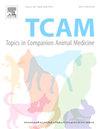Coinfection of Klebsiella oxytoca and Granulicatella adiacens promoting fatal fibrinonecrotic enteritis in a red footed-tortoise (Chelonoidis carbonaria)
IF 1.3
3区 农林科学
Q2 VETERINARY SCIENCES
引用次数: 0
Abstract
Enteric bacterial infections in reptiles are commonly caused by Gram-negative bacteria with zoonotic importance, with few reports of Gram-positive bacteria as a causative agent of such infections. This case report presents a fatal case of fibrinonecrotic enteritis in a red-footed tortoise. After necropsy, microscopic and microbiological analyses of the small intestine were performed, suggesting the occurrence of a coinfection with two bacteria. Both isolates were subjected to partial 16S-rDNA sequencing and identified as Klebsiella oxytoca and Granulicatella adiacens. While Klebsiella oxytoca is a well-documented pathogen in reptiles, Granulicatella adiacens has previously been reported only in abscesses of domestic rabbits (Oryctolagus cuniculus), injured tissues of Ozark hellbenders (Cryptobranchus alleganiensis bishopi), and human infections, suggesting a potential unexplored zoonotic risk. This is the first report of enteric co-infection with K. oxytoca and G. adiacens, highlighting the need for further investigation into the potential impact of G. adiacens on reptile health and its possible zoonotic implications.
在红脚龟(Chelonoidis carbonaria)中,氧化克雷伯氏菌和粘连肉芽菌的共同感染促进致死性纤维蛋白坏死性肠炎。
爬行动物的肠道细菌感染通常是由具有人畜共患重要性的革兰氏阴性细菌引起的,革兰氏阳性细菌作为这种感染的病原体的报道很少。这个病例报告提出了一个致命的病例纤维蛋白坏死性肠炎的红足龟。尸检后,对小肠进行了显微镜和微生物学分析,表明发生了两种细菌的共同感染。经16S-rDNA部分测序,鉴定为克雷伯氏菌(Klebsiella oxytoca)和棘粒菌(Granulicatella adiacens)。虽然克雷伯氏菌在爬行动物中是一种有充分证据的病原体,但先前仅在家兔(Oryctolagus cuuniculus)的脓肿、Ozark地狱弯曲者(Cryptobranchus alleganiensis bishopi)的损伤组织和人类感染中报道过棘突颗粒菌,这表明存在潜在的未被探索的人畜共患风险。这是首个关于隐裂棘球绦虫和裂裂棘球绦虫肠道共感染的报告,强调需要进一步调查裂裂棘球绦虫对爬行动物健康的潜在影响及其可能的人畜共患意义。
本文章由计算机程序翻译,如有差异,请以英文原文为准。
求助全文
约1分钟内获得全文
求助全文
来源期刊

Topics in companion animal medicine
农林科学-兽医学
CiteScore
2.30
自引率
0.00%
发文量
60
审稿时长
88 days
期刊介绍:
Published quarterly, Topics in Companion Animal Medicine is a peer-reviewed veterinary scientific journal dedicated to providing practitioners with the most recent advances in companion animal medicine. The journal publishes high quality original clinical research focusing on important topics in companion animal medicine.
 求助内容:
求助内容: 应助结果提醒方式:
应助结果提醒方式:


